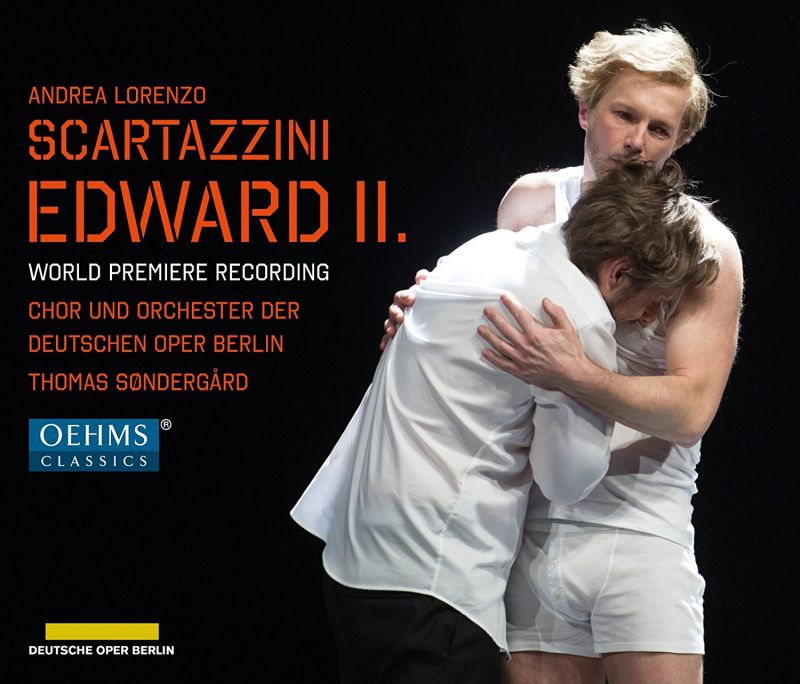SCARTAZZINI Edward II
View record and artist detailsRecord and Artist Details
Composer or Director: Andrea Lorenzo Scartazzini
Genre:
Opera
Label: Oehms
Magazine Review Date: 03/2018
Media Format: CD or Download
Media Runtime: 85
Mastering:
DDD
Catalogue Number: OC969

Tracks:
| Composition | Artist Credit |
|---|---|
| Edward II |
Andrea Lorenzo Scartazzini, Composer
Agneta Eichenholz, Isabella, Soprano Andrea Lorenzo Scartazzini, Composer Andrew Harris, Roger Mortimer, Bass Burkhard Ulrich, Walter Langton; Bishop of Coventry, Tenor Das Orchester der Deutschen Oper Berlin Der Chor der Deutschen Oper Berlin Gideon Poppe, Soldier; Minister; Council; Guard; Tourguide;, Tenor James Kryshak, Lightborn, Tenor Jarrett Ott , Angel, Baritone horn Ladislav Elgr, Piers de Gaveston, Tenor Markus Brück, Soldier; Minister; Council; Guard; Tourguide;, Baritone Mattis van Hasselt, Prince Edward, Treble Michael Nagy, Edward II, Baritone Thomas Søndergård, Conductor |
Author: Andrew Mellor
Not that Scartazzini is afraid to put his audience through the mill in his Swiss-written, German-staged telling of an English story premiered in 2017. Over the course of Edward II’s Hamlet-like downward trajectory, electronic elements in the score wrap the audience in fear and violence. The orchestra is no shrinking violet either, shrieking loudly like Andriessen one moment and appearing eerily wind-blown à la Lachenmann the next. Violence breeds violence in this piece, but there is salvation at the last in what sounds like a dramatic masterstroke: after we’ve witnessed the 90-minute descent of this 14th-century monarch persecuted for his sexuality, a group of modern-day tourists (presumably of varied sexual orientations) is ushered into the room in which he was murdered and the cool facts of the matter are recounted by a tour guide.
The aloof, muttering tourists have the same chilling emotional detachment as the children in the dying moments of Wozzeck but that is the dramatic coup, wrenching the story out of time and place. That’s how it seemed to me, anyway, but in truth it’s hard to tell given there is no translation to accompany the German libretto and we’re relying on a one-dimensional audio capturing of a three-dimensional piece. Nor can this one moment – in which a lack of dramatic musical churn actually works very well in a theatrical sense – atone entirely for the absence of the same elsewhere.
Other than that, this to-the-point score gets a tight performance under Thomas Søndergård and there is some mightily effective singing. Michael Nagy delivers Edward’s notes with consistent fortitude, underlining Scartazzini’s belief that he was more a brutalised animal than a victim but not conveying a great deal of change (though, without that translation, it’s hard for me to trace to what extent that exists in the libretto). More obvious is that Agneta Eichenholz captures Isabella’s change of heart – after fantasising about a sex change that might allow her husband to love her, she joins his persecutors – and she has just as much vocal presence. The other parts are taken well but strangely; Isabella is the only female role while the composer casts his supplementary, redemptive angel as a male transvestite.
Discover the world's largest classical music catalogue with Presto Music.

Gramophone Digital Club
- Digital Edition
- Digital Archive
- Reviews Database
- Full website access
From £8.75 / month
Subscribe
Gramophone Full Club
- Print Edition
- Digital Edition
- Digital Archive
- Reviews Database
- Full website access
From £11.00 / month
Subscribe
If you are a library, university or other organisation that would be interested in an institutional subscription to Gramophone please click here for further information.




